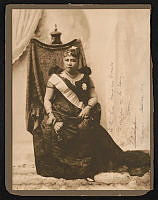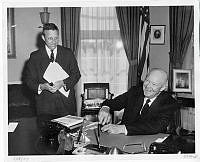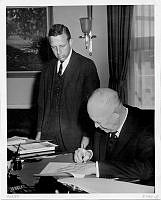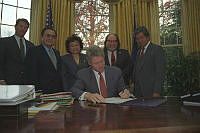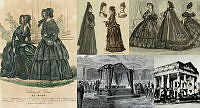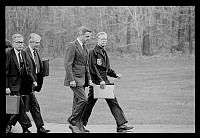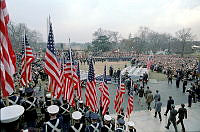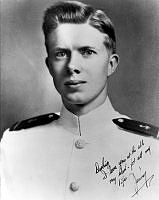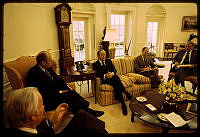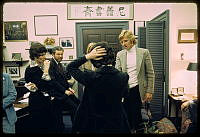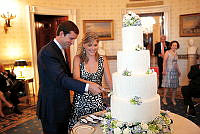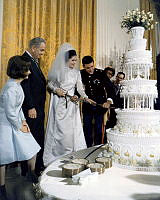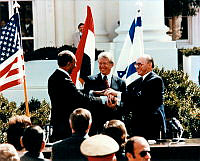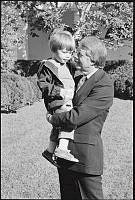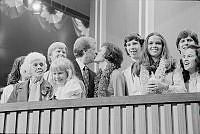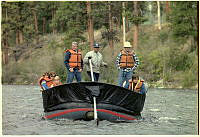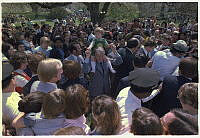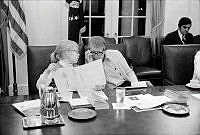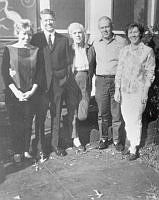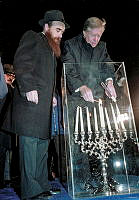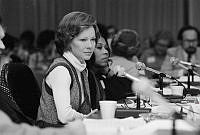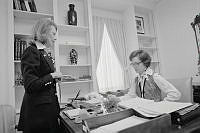Ronald Reagan
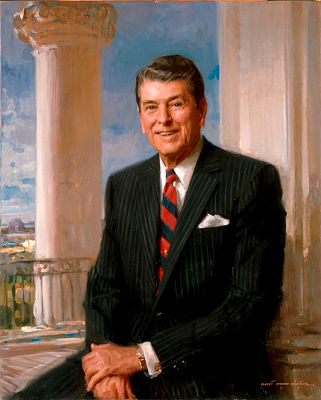
Through Ronald Reagan's eight years in office, the cold war came to an end, the country seemed to regain its morale, and Americans enjoyed an extended economic boom.
Ronald Wilson Reagan was born to John Reagan, a shoe salesman, and his wife Nelle in Tampico, Illinois, on February 6, 1911. He worked his way through Eureka College. There, he played on the football team and acted in school plays. Upon graduation, he became a radio sports announcer. A screen test in 1937 won him a contract with Warner Brothers in Hollywood. During the next two decades, he appeared in 53 films, including "Kings Row" and "Knute Rockne, All American." During a first marriage to actress Jane Wyman, he had two children, Maureen and Michael.
After World War II, his marriage failed, and in 1952, he married actress Nancy Davis, who brought him children Patti and Ronald. Elected president of the Screen Actors Guild, Reagan fought communism in the film industry and grew more conservative. As host of "GE Theater," he toured the country and became a spokesman for conservatism. In 1966, he defeated incumbent Pat Brown to become governor of California, and was reelected in 1970.
In 1976, he narrowly missed taking the Republican nomination away from President Ford, but prevailed in the 1980 primaries. For most of the fall campaign, Reagan ran close to President Carter. Voters were troubled by high inflation and unemployment, America's failure to prevent the Soviet invasion of Afghanistan, and the year-long confinement of American hostages in Iran, but they were nervous about Reagan's lack of foreign policy experience and what some found his excessive hostility towards the Soviet Union. But 10 days before the election, debating with Carter, Reagan resolved those doubts in a bravura performance, asking Americans, "Are you better off now than you were four years ago?" The result was a landslide of 489 electoral votes to 49 for Carter.
During his first months in office, Reagan persuaded Congress to expand the defense budget, cut taxes, and take other measures to fight the recession. He challenged the Soviet Union aggressively, hoping to show the Soviets that the United States had regained its will and compel them to enter serious negotiations.
Seventy days after taking office, Reagan was shot by John Hinckley, who suffered from mental illness.
His grace and wit during a near-death experience (writing his wife, "Honey, I forgot to duck") caused his popularity to soar. Later, when his poll ratings dropped, he privately joked, "I'll just get shot again!" Renewed national self-confidence and restored prosperity helped Reagan and Vice President George Bush win a second term (under the slogan "Bringing America Back Stronger, Prouder, Better") by a landslide over Carter's vice president, Walter Mondale, and New York Congresswoman Geraldine Ferraro.
In 1986, Reagan pushed an income tax reform bill through Congress but found that his dream of reducing the national deficit (in fact, deficits under Reagan ballooned) and the size of government was beyond his grasp. That November, Congress and the courts investigated what became known as the Iran-Contra scandal. High officials of his administration had secretly approved the sale of weaponry to Iran and illegally diverted the proceeds to anti-government "freedom-fighters" in Nicaragua. But Congress and the appointed Tower Commission concluded that there was no evidence to prove that Reagan knew personally about the transactions, and he remained in office.
Reagan's second term also saw partnership with the the new Soviet leader Mikhail Gorbachev to ease Cold War tensions. Through five dramatic summit meetings, the two men agreed on a treaty banning intermediate-range nuclear missiles and other joint steps to end American-Soviet hostility.
In 1989, Reagan and Nancy returned to Los Angeles, where he wrote his memoirs. Ten years before his death in 2004, he wrote a letter to Americans explaining that he had been diagnosed with Alzheimer's disease and thanking them "for giving me the great honor of allowing me to serve as your president. . . . I know that for America there will always be a bright dawn ahead."













